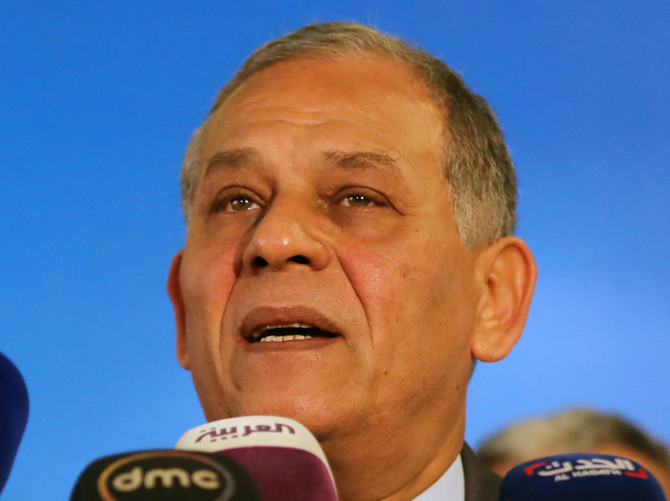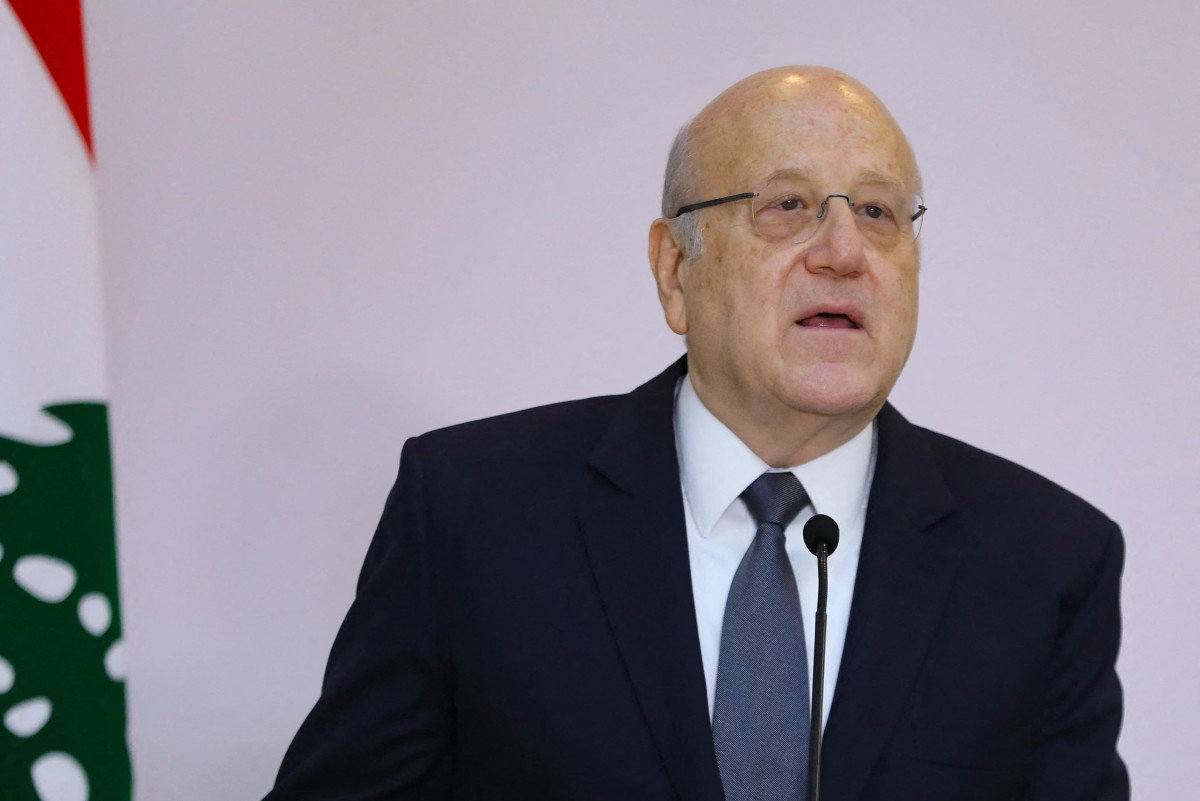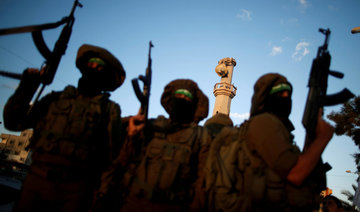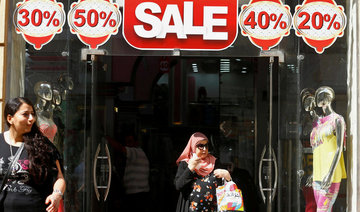CAIRO: A former Egyptian lawmaker said Monday he will not run in the March presidential election, saying the political “climate” wasn’t conducive to campaigning.
Mohammed Anwar Sadat, nephew of Egypt’s late leader Anwar Sadat, told reporters his decision was partially taken to protect his campaign workers from intimidation or arrest by authorities.
“We don’t want people in the campaign to be hurt,” he said.
He said he has no intention to contest a “lost battle” and cited emergency laws in force since last April and a 2013 ban on unauthorized demonstrations as further reasons for his decision.
“My decision not to run primarily has to do with the climate in which you don’t feel there will be a genuine competition or equal opportunities,” he said.
Sadat, an outspoken critic of the government, was thrown out of parliament last year amid allegations he had leaked official documents to foreign diplomats.
He is the second presidential hopeful to pull out of the election, which is virtually certain to be won by incumbent Abdel-Fattah El-Sisi, who has yet to formally announce his candidacy.
Last week, former prime minister and career air force officer Ahmed Shafiq also pulled out of the race, saying he was not the “ideal” person to lead the country at this stage. He was harshly criticized by pro-government media after declaring his intention to run.
Shafiq finished a close second behind Muhammad Mursi in the 2012 elections. The following year, El-Sisi led the military’s ouster of Mursi and was elected in 2014 after a landslide win.
Under the constitution, any would-be candidate must have formal “recommendations” from at least 20 lawmakers or 25,000 support signatures from voters, with a minimum of 1,000 each from 15 of Egypt’s 29 provinces.
Most lawmakers have already endorsed El-Sisi, who has led a heavy crackdown since 2013 that has jailed thousands of opponents, mainly Islamists but also secular activists, including many of those involved in the 2011 uprising that toppled longtime autocrat Hosni Mubarak.
Under El-Sisi’s rule, street protests have been effectively banned, human rights groups have been placed under severe restrictions and many critics in the media have been silenced.
But the general-turned-president has also spent much of the past four years trying to revive the economy while fighting an increasingly emboldened insurgency by Islamic militants.
Sadat claimed his supporters were harassed and threatened by security agents as they processed paperwork to nominate him.
“We dream of ... an election where the winner is not known until the last moment,” he said.
Another hopeful, rights lawyer Khaled Ali, has also claimed the climate is biased in favor of El-Sisi. Ali became known when he won a court case that annulled Egypt’s transfer of two Red Sea islands to Saudi Arabia. The government went ahead with the transfer after the agreement was hurriedly ratified by parliament.
Ali was convicted and sentenced to three months in prison in September for allegedly making an obscene gesture while celebrating the court’s ruling last January. He is appealing the verdict, but if his conviction is upheld he will not be eligible to run.
Former Egyptian lawmaker pulls out of presidential race
Former Egyptian lawmaker pulls out of presidential race

Netanyahu says 6 more hostages to be freed next week

JERUSALEM: Israeli Prime Minister Benjamin Netanyahu said late Sunday that another six hostages would be released in the coming week, after talks with Hamas.
Three would be released on Thursday and another three on Saturday, said a statement from his office, adding that Netanyahu would allow Palestinians to return to the north of Gaza from Monday.
Trump’s Palestinian refugee idea falls flat with Jordan and confounds a Senate ally

- Egypt and Jordan have made peace with Israel but support the creation of a Palestinian state in the occupied West Bank, Gaza and east Jerusalem, territories that Israel captured in the 1967 Mideast War
- Both Egypt and Jordan also have perpetually struggling economies and their governments, as well as those of other Arab states, fear massive destabilization of their own countries and the region from any such influx of refugees
DORAL, Florida: President Donald Trump’s push to have Egypt and Jordan take in large numbers of Palestinian refugees from besieged Gaza fell flat with those countries’ governments and left a key congressional ally in Washington perplexed on Sunday.
Fighting that broke out in the territory after ruling Hamas attacked Israel in October 2023 is paused due to a fragile ceasefire, but much of Gaza’s population has been left largely homeless by an Israeli military campaign. Trump told reporters Saturday aboard Air Force One that moving some 1.5 million people away from Gaza might mean that “we just clean out that whole thing.”
Trump relayed what he told Jordan’s King Abdullah when the two held a call earlier Saturday: “I said to him, ‘I’d love for you to take on more because I’m looking at the whole Gaza Strip right now, and it’s a mess.’”
He said he was making a similar appeal to Egyptian President Abdel Fattah El-Sisi during a conversation they were having while Trump was at his Doral resort in Florida on Sunday. Trump said he would “like Egypt to take people and I’d like Jordan to take people.”
Egypt and Jordan, along with the Palestinians, worry that Israel would never allow them to return to Gaza once they have left. Both Egypt and Jordan also have perpetually struggling economies and their governments, as well as those of other Arab states, fear massive destabilization of their own countries and the region from any such influx of refugees.
Jordan already is home to more than 2 million Palestinian refugees. Egypt has warned of the security implications of transferring large numbers of Palestinians to Egypt’s Sinai Peninsula, bordering Gaza.
Trump suggested that resettling most of Gaza’s population of 2.3 million could be temporary or long term.
Jordan’s foreign minister, Ayman Safadi, said Sunday that his country’s opposition to what Trump floated was “firm and unwavering.” Some Israel officials had raised the idea early in the war.
Egypt’s foreign minister issued a statement saying that the temporary or long-term transfer of Palestinians “risks expanding the conflict in the region.”
Trump does have leverage to wield over Jordan, which is a debt-strapped, but strategically important, US ally and is heavily dependent on foreign aid. The US is historically the single-largest provider of that aid, including more than $1.6 billion through the State Department in 2023.
Much of that comes as support for Jordan’s security forces and direct budget support.
Jordan in return has been a vital regional partner to the US in trying to help keep the region stable. Jordan hosts some 3,000 US troops. Yet, on Friday, new Secretary of State Marco Rubio exempted security assistance to Israel and Egypt but not to Jordan, when he laid out the details of a freeze on foreign assistance that Trump ordered on his first day in office.
Meantime, in the United States, even Trump loyalists tried to make sense of his words.
“I really don’t know,” said Sen. Lindsey Graham, when asked on CNN’s “State of the Union” about what Trump meant by the ”clean out” remark. Graham, who is close to Trump, said the suggestion was not feasible.
“The idea that all the Palestinians are going to leave and go somewhere else, I don’t see that to be overly practical,” said Graham, R-S.C. He said Trump should keep talking to Mideast leaders, including Saudi Crown Prince Mohammed bin Salman and officials in the United Arab Emirates.
“I don’t know what he’s talking about. But go talk to MBS, go talk to UAE, go talk to Egypt,” Graham said. “What is their plan for the Palestinians? Do they want them all to leave?”
Trump, a staunch supporter of Israel, also announced Saturday that he had directed the US to release a supply of 2,000-pound bombs to Israel. Former President Joe Biden had imposed a hold due to concerns about their effects on Gaza’s civilian population.
Egypt and Jordan have made peace with Israel but support the creation of a Palestinian state in the occupied West Bank, Gaza and east Jerusalem, territories that Israel captured in the 1967 Mideast War. They fear that the permanent displacement of Gaza’s population could make that impossible.
In making his case for such a massive population shift, Trump said Gaza is “literally a demolition site right now.”
“I’d rather get involved with some of the Arab nations, and build housing in a different location,” he said of people displaced in Gaza. “Where they can maybe live in peace for a change.”
Syria monitor says 35 people summarily executed in three days

- Most of those executed are former officers in the toppled Assad government who had presented themselves in centers set up by the new authorities, according to the Britain-based monitor with a network of sources inside Syria
DAMASCUS: Fighters affiliated with Syria’s new Islamist leaders have carried out 35 summary executions over 72 hours, mostly of Assad-era officers, a war monitor said Sunday.
The authorities, installed by the rebel forces that toppled longtime president Bashar Assad last month, said they had carried out multiple arrests in the western Homs area over unspecified “violations.”
Official news agency SANA said the authorities on Friday accused members of a “criminal group” who used a security sweep to commit abuses against residents, “posing as members of the security services.”
The Syrian Observatory for Human Rights monitor said that “these arrests follow grave violations and summary executions that had cost the lives of 35 people over the past 72 hours.”
It also said that “members of religious minorities” had suffered “humiliations.”
Most of those executed are former officers in the toppled Assad government who had presented themselves in centers set up by the new authorities, according to the Britain-based monitor with a network of sources inside Syria.
“Dozens of members of local armed groups under the control of the new Sunni Islamist coalition in power who participated in the security operations” in the Homs area “have been arrested,” the Observatory said.
It added that these groups “carried out reprisals and settled old scores with members of the Alawite minority to which Bashar Assad belongs, taking advantage of the state of chaos, the proliferations of arms and their ties to the new authorities.”
The Observatory listed “mass arbitrary arrests, atrocious abuse, attacks against religious symbols, mutilations of corpses, summary and brutal executions targeting civilians,” which it said showed “an unprecedented level of cruelty and violence.”
Civil Peace Group, a civil society organization, said in a statement that there had been civilian victims in multiple villages in the Homs area during the security sweep.
The group “condemned the unjustified violations” including the killing of unarmed men.
Since seizing power, the new authorities have sought to reassure religious and ethnic minorities in Syria that their rights would be upheld.
Members of Assad’s Alawite minority have expressed fear of retaliation over abuses during his clan’s decades in power.
US says ceasefire agreement between Lebanon, Israel to continue until February 18

- Lebanon confirms adhering to the extended ceasefire agreement, says Lebanese caretaker Prime Minister Najib Mikati
- Israeli forces killed 22 people in south Lebanon on Sunday as a deadline for their withdrawal passed
WASHINGTON: The US said on Sunday that the agreement between Lebanon and Israel would remain in effect until Feb. 18, after Israel said on Friday it would keep troops in the south beyond the Sunday deadline set out in a US-brokered ceasefire that halted last year’s war with Hezbollah.
“The arrangement between Lebanon and Israel, monitored by the United States, will continue to be in effect until February 18, 2025,” the White House said in a statement.
Lebanese caretaker Prime Minister Najib Mikati said in a statement early on Monday that Lebanon confirmed it will continue to adhere to the extended ceasefire agreement.

Israeli forces killed 22 people in south Lebanon on Sunday as a deadline for their withdrawal passed and thousands of people tried to return to their homes in defiance of Israeli military orders, Lebanese authorities said.
Lebanon’s US-backed military, which reported one of its soldiers among those killed by Israeli forces on Sunday, has accused Israel of procrastinating in its withdrawal.
The Hezbollah-Israel conflict was fought in parallel with the Gaza war, and peaked in a major Israeli offensive that uprooted more than a million people in Lebanon and left the Iran-backed group badly weakened.
Israel has not said how long its forces would remain in the south, where the Israeli military says it has been seizing Hezbollah weapons and dismantling its infrastructure.
Israel said its offensive against Hezbollah aimed to secure the return home of tens of thousands of Israelis who were forced to leave homes at the border by Hezbollah rocket fire.
Hezbollah opened fire in support of its Palestinian ally Hamas at the start of the Gaza war on Oct. 8, 2023.
The White House on Sunday also said the governments of Lebanon, Israel and the US would begin negotiations for “the return of Lebanese prisoners captured after October 7, 2023.”
Arab League says any plan to uproot Palestinians from Gaza would be ‘ethnic cleansing’

- The regional bloc was reacting to US President Trump's suggestion to “clean out” the Gaza Strip and move its population to Egypt and Jordan
- Egyptian President El-Sisi has repeatedly warned that any planned displacement would threaten Egypt’s national security
CAIRO: The Arab League on Sunday warned against “attempts to uproot the Palestinian people from their land,” after US President Donald Trump suggested a plan to “clean out” the Gaza Strip and move its population to Egypt and Jordan.
“The forced displacement and eviction of people from their land can only be called ethnic cleansing,” the regional bloc’s general secretariat said in a statement.
“Attempts to uproot the Palestinian people from their land, whether by displacement, annexation or settlement expansion, have been proven to fail in the past,” the statement added.
Earlier Sunday, Egypt vehemently expressed its objection to Trump's suggestion.
Cairo’s foreign ministry in a statement expressed Egypt’s “continued support for the steadfastness of the Palestinian people on their land.”
It “rejected any infringement on those inalienable rights, whether by settlement or annexation of land, or by the depopulation of that land of its people through displacement, encouraged transfer or the uprooting of Palestinians from their land, whether temporarily or long-term.”
After 15 months of war, Trump said Gaza had become a “demolition site” and he would “like Egypt to take people, and I’d like Jordan to take people.”
Moving Gaza’s inhabitants could be done “temporarily or could be long term,” he said.
Since the start of the Israel-Hamas war in October 2023 both countries have warned of plans to displace Palestinians from Gaza into neighboring Egypt and from the West Bank into Jordan.
Egyptian President Abdel Fattah El-Sisi, with whom Trump said he would speak on Sunday, has repeatedly warned that said displacement would aim to “eradicate the cause for Palestinian statehood.”
El-Sisi has described the prospect as a “red line” that would threaten Egypt’s national security.
The Egyptian foreign ministry on Sunday urged the implementation of the “two-state solution,” which Cairo has said would become impossible if Palestinians were removed from their territories.



















